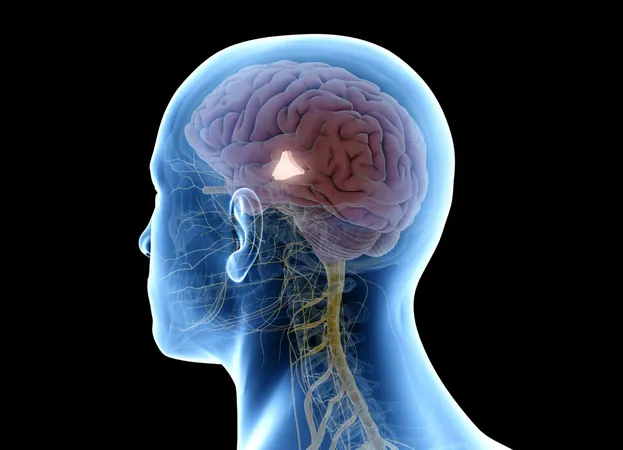
Discover the "Aging Hotspot" in Your Brain That Could Unlock the Secret to Longevity!
2025-01-02
Author: Wei
Discover the "Aging Hotspot" in Your Brain That Could Unlock the Secret to Longevity!
In a groundbreaking study by researchers at the Allen Institute, a specific region in the brains of mice has been identified as a key area where aging initiates dramatic changes in various cell types. Revealed in the prestigious journal Nature, this vital discovery has important implications for understanding and potentially slowing down the aging process in our brains.
The focus of the research was on glial cells—often referred to as the brain's "support cells"—which exhibited notable shifts in gene activity with age. Among the most affected cell types were microglia, macrophages, oligodendrocytes, tanycytes, and ependymal cells. Strikingly, the study highlighted that as the brain ages, there is a significant increase in gene activity related to inflammation, alongside a worrying decline in the activity of genes crucial to neuronal health.
The "Aging Hotspot" Identified in the Hypothalamus
This landmark study zeroed in on what the researchers describe as an "aging hotspot" located in the hypothalamus, a brain area that plays a crucial role in regulating various bodily functions, including food intake, metabolism, and energy balance. The most significant gene expression shifts were found in the cells proximate to the third ventricle of the hypothalamus.
According to lead author Kelly Jin, "Our hypothesis is that these cell types are becoming less efficient at processing signals from our environment, which affects how we age overall. This insight opens up remarkable possibilities in our understanding of aging."
Cutting-Edge Analysis Unveils Vital Clarity
Utilizing innovative single-cell RNA sequencing techniques and high-resolution mapping developed through The BRAIN Initiative®, the research team analyzed over 1.2 million brain cells from mice categorized as "young" (two months old) and "late middle-aged" (18 months old). Mice serve as a valuable model due to their comparable structural and functional brain features to humans, enabling deeper insights into the aging process.
As Richard J. Hodes, director of the NIH's National Institute on Aging, remarked, "These findings offer a detailed map of brain cells that may be most impacted by aging. This new framework could fundamentally reshape how we view brain aging and guide the development of treatments for aging-related brain diseases."
Creating New Pathways for Potential Therapies
Notably, the study discovered that specific clusters of cells within the hypothalamus experienced a concerning drop in neuron-essential gene activity, while inflammatory gene activity saw a rise. Researchers believe that closely examining this hotspot could pave the way for targeted therapeutic interventions.
"With a focus on these specific cell types, we hope to develop tools that could enhance their function. Is it possible to delay the aging process this way?" posed Hongkui Zeng, executive vice president and director of the Allen Institute for Brain Science.
The Influence of Lifestyle on Brain Aging
The results of this study also underscore previous research linking aging to metabolic changes and point to the potential benefits of dietary strategies such as intermittent fasting and balanced nutrition on longevity. Although direct dietary tests weren’t part of this research, the study highlights key cell types that may play critical roles in the aging process, giving scientists new leads to explore.
"The implication is significant because it highlights rare populations of neurons that exhibit specific gene expressions," Jin elaborated.
Charting a Path to Healthy Aging
The research serves as a springboard for future studies aimed at understanding how various factors—including diet, lifestyle choices, and pharmaceuticals—could mitigate the age-related decline in brain health. By identifying vulnerable cell types, scientists hope to formulate effective strategies, be it through dietary changes or medical treatments, to sustain healthy brain function into old age.
"Our study is critical because it identifies the real key players in the aging process," Zeng emphasized. "The intricate study of these specific cell types is vital in uncovering the full picture of how aging affects the brain."
As researchers delve deeper into this intriguing link between hypothalamic cells and aging, this research path promises to unlock valuable insights that could help preserve cognitive functions and combat age-related diseases.
Stay tuned—you won't want to miss the exciting developments in this groundbreaking area of brain science!


 Brasil (PT)
Brasil (PT)
 Canada (EN)
Canada (EN)
 Chile (ES)
Chile (ES)
 Česko (CS)
Česko (CS)
 대한민국 (KO)
대한민국 (KO)
 España (ES)
España (ES)
 France (FR)
France (FR)
 Hong Kong (EN)
Hong Kong (EN)
 Italia (IT)
Italia (IT)
 日本 (JA)
日本 (JA)
 Magyarország (HU)
Magyarország (HU)
 Norge (NO)
Norge (NO)
 Polska (PL)
Polska (PL)
 Schweiz (DE)
Schweiz (DE)
 Singapore (EN)
Singapore (EN)
 Sverige (SV)
Sverige (SV)
 Suomi (FI)
Suomi (FI)
 Türkiye (TR)
Türkiye (TR)
 الإمارات العربية المتحدة (AR)
الإمارات العربية المتحدة (AR)